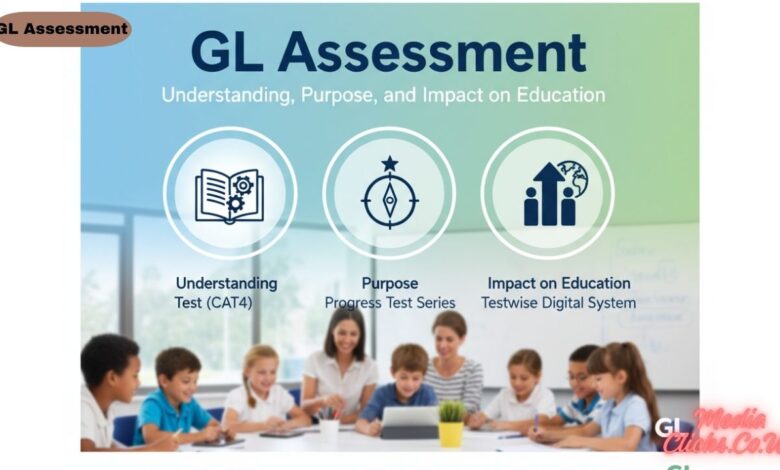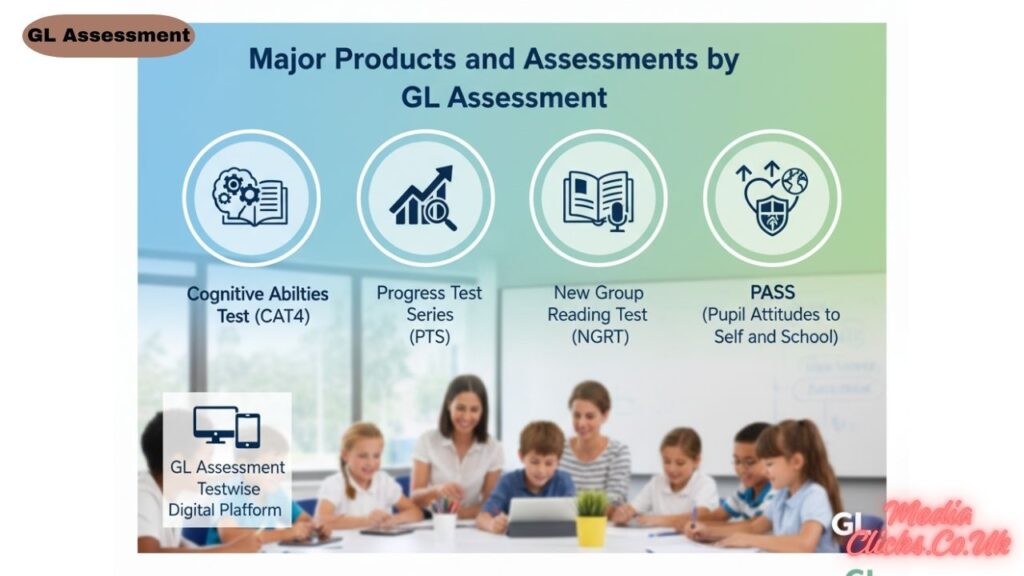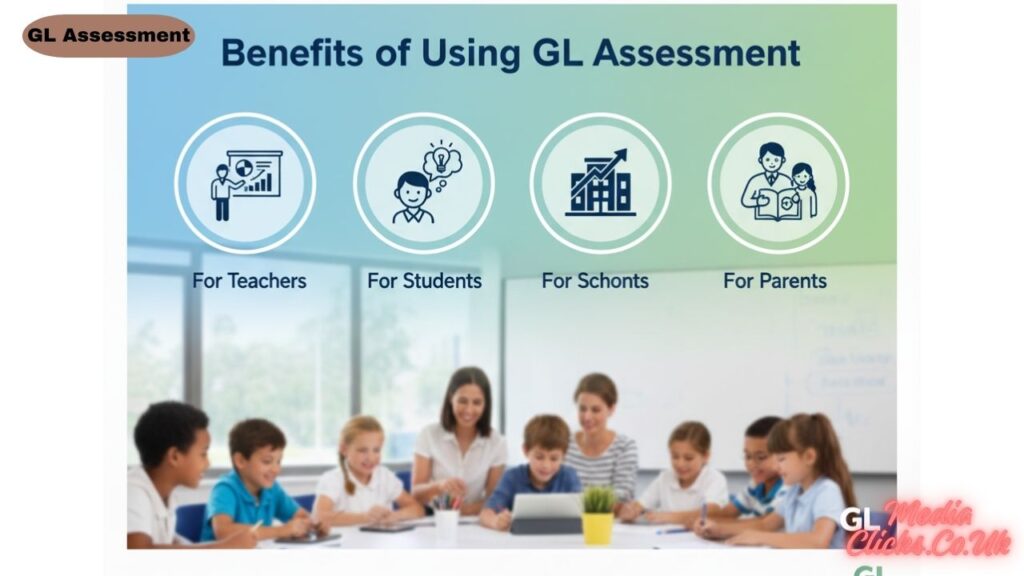GL Assessment Understanding, Purpose, and Impact on Education

Introduction to GL Assessment
Education in today’s world relies heavily on reliable, research-backed data to support both teachers and learners. Among the leading organizations in this field, GL Assessment stands out for its commitment to enhancing learning through accurate measurement. But what is GL Assessment, and why is it such a crucial name in education?
GL Assessment—formerly known as Granada Learning—is a UK-based company that designs and provides educational assessment tools for schools around the world. These assessments help schools measure cognitive ability, literacy, numeracy, and student well-being. Through this, educators can make informed decisions to improve teaching and learning outcomes.
The purpose of GL Assessment is to ensure that every child’s potential is accurately identified. Whether through the Cognitive Abilities Test (CAT4) or the Progress Test Series, the company enables teachers to tailor their approach to each learner’s needs. The company also provides GL Assessment papers, practice papers, and digital testing systems like GL Assessment Testwise, ensuring accessibility for both teachers and students.
In the UK and internationally, standardized testing plays an essential role in maintaining educational consistency. By offering tools that combine academic measurement and emotional insight, GL Assessment has become a trusted partner for thousands of schools globally.
The History and Evolution of GL Assessment
The roots of GL Assessment date back to its founding as part of Granada Learning, a company dedicated to improving education through innovation. Over time, it evolved into a global provider of educational assessments, known simply as GL Assessment.
Throughout the years, the organization has achieved several key milestones. It introduced cognitive ability tests that revolutionized how schools understand student potential. By collaborating with psychologists and educational researchers, GL Assessment refined its methods to ensure accuracy, fairness, and inclusivity.
Partnerships with educational bodies and government departments have allowed GL Assessment to expand its reach across the UK and internationally. Today, schools in over 100 countries use GL Assessments to inform curriculum decisions, benchmark progress, and identify learning gaps.
The company’s reputation for quality and trustworthiness continues to grow, largely due to its long-standing collaboration with educators and its focus on evidence-based approaches.
Core Purpose and Educational Philosophy
At its heart, GL Assessment believes that every child has unique abilities that must be recognized and nurtured. The company’s mission and vision revolve around enabling educators to make confident, data-driven decisions that empower students to succeed.
Their commitment to evidence-based education ensures that every product is supported by research and validated through classroom use. This approach helps teachers identify learning strengths and areas that need additional support.
Psychometric testing and data analysis form the backbone of GL Assessment’s philosophy. By understanding how students think and learn, educators can design targeted strategies for improvement. The company’s tools not only measure academic progress but also provide valuable insights into emotional wellbeing and motivation—critical factors in learning success.
Major Products and Assessments by GL Assessment

Cognitive Abilities Test (CAT4)
One of the most recognized products by GL Assessment is the Cognitive Abilities Test, or CAT4. This test measures reasoning abilities in four key areas: verbal, non-verbal, quantitative, and spatial.
Schools use CAT4 to identify students’ learning potential and to understand how they process information. The test results help teachers adapt their methods to better suit different learning styles. CAT4 is not a measure of academic knowledge but of ability—making it a valuable predictor of future success.
When parents and teachers review GL Assessment papers from CAT4, they gain deeper insights into each child’s strengths. Scoring and interpretation are designed to be transparent and easy to understand, ensuring the results lead to actionable learning strategies.
Progress Test Series (PTS)
The Progress Test Series (PTS) evaluates core subjects such as English, Maths, and Science. It enables schools to track a student’s progress over time and compare it to national standards.
Educators value the PTS assessments because they combine reliability with detailed reporting. They provide not just a score but also a breakdown of skills—highlighting where improvement is needed. This level of feedback helps teachers personalize lessons to individual needs, fostering both achievement and confidence in students.
New Group Reading Test (NGRT)
The New Group Reading Test (NGRT) is a widely used tool for assessing reading ability. It helps schools monitor literacy development and identify students who may need extra support.
By using GL Assessment practice papers, students can prepare for NGRT in a stress-free way, familiarizing themselves with the question style. The test’s design ensures that both comprehension and vocabulary are accurately measured, providing educators with a balanced view of each student’s reading skills.
PASS (Pupil Attitudes to Self and School)
Academic performance is closely linked with a student’s emotional wellbeing. The PASS survey focuses on understanding students’ attitudes toward themselves and their school environment.
This assessment helps teachers identify potential barriers to learning, such as low self-esteem or anxiety. By addressing these issues early, schools can create more positive learning environments. The PASS assessment is one of GL Assessment’s most impactful tools in promoting student engagement and wellbeing.
Additional Assessments
Beyond these core assessments, GL Assessment offers specialized tools such as the Dyslexia Screening Test, the British Ability Scales (BAS3), and wellbeing surveys. These are particularly useful for early years and secondary education, ensuring that learners of all ages receive proper support.
Schools can choose between digital and paper-based testing. Digital testing, through platforms like GL Assessment Testwise, provides instant reporting and analytics. This flexibility allows educators to administer tests efficiently and securely.
How GL Assessment Works
The process begins with schools registering for assessments via the GL Assessment login portal. Teachers select the appropriate tests and administer them through the Testwise system or paper format.
After students complete the assessments, data is analyzed automatically, generating detailed reports that highlight individual and group performance. These insights allow teachers to identify patterns, strengths, and weaknesses.
GL Assessment’s reporting tools also integrate with school management systems, ensuring smooth data flow and easy access for educators. Through this structured process, the company ensures that schools have actionable insights rather than raw scores.
Benefits of Using GL Assessment

For Teachers
Teachers gain access to high-quality data that supports evidence-based teaching. They can tailor instruction according to each student’s learning profile and progress.
For Students
Assessments such as CAT4 and PTS help students understand their own abilities, boosting confidence and engagement.
For Schools
GL Assessment enables schools to benchmark their performance against national or international standards, fostering accountability and continuous improvement.
For Parents
Parents benefit from transparent reports that explain how their child learns best and where they might need extra help.
Overall, GL Assessment papers and reports help create a collaborative environment between teachers, students, and parents—focused on genuine learning progress.
GL Assessment and Educational Equity
One of GL Assessment’s strongest values is its commitment to fairness and inclusion. Its tests are designed to accommodate students with special educational needs (SEN), English as an Additional Language (EAL), or those identified as gifted.
By providing a balanced and inclusive assessment framework, GL Assessment promotes equal opportunities for every learner, ensuring that no child is overlooked due to background or learning style.
International Reach of GL Assessment
GL Assessment’s influence extends well beyond the UK. Its assessments are used in international schools in over 100 countries.
The company works closely with Cambridge Assessment International Education and other partners to ensure that its tools align with global curricula. Whether in Europe, the Middle East, or Asia, GL Assessments support schools in maintaining consistent academic standards worldwide.
GL Assessment in Practice
Numerous schools report significant improvements in teaching strategies after implementing GL Assessment tools. For instance, using CAT4 data allows teachers to predict future academic outcomes, while the PASS survey enhances student wellbeing initiatives.
These impact stories demonstrate how actionable insights can transform classrooms. Teachers interpret reports to make personalized lesson plans and track outcomes effectively.
Technology and Innovation
GL Assessment continues to innovate by integrating AI and adaptive testing technologies into its systems. The move toward digital assessment allows for faster processing, reduced administrative work, and better analytics.
The Testwise platform has become a core part of this innovation, allowing remote and online testing—an approach that proved essential during and after the COVID-19 pandemic.
Data visualization dashboards make it easy for educators to see trends and act quickly on findings.
Challenges and Criticisms
Like all standardized testing providers, GL Assessment faces scrutiny regarding test pressure and data privacy. Some argue that standardized tests can cause anxiety among students.
However, GL Assessment addresses these concerns by promoting a holistic view of student performance. Rather than labeling students, the company emphasizes support and growth. Its data protection policies also ensure student information is handled responsibly.
Support and Training for Educators
GL Assessment provides a wide range of teacher training resources, including webinars and data interpretation guides. These help educators understand how to make the most of assessment results.
Professional development sessions empower teachers to use data for personalized instruction, making assessments a tool for growth rather than judgment.
Comparison: GL Assessment vs Other Educational Assessment Providers
While there are other providers like Cambridge CEM and NFER, GL Assessment distinguishes itself through its comprehensive suite of tools, global recognition, and focus on student wellbeing.
Schools often choose GL Assessment because of its reliability, transparent reporting, and integration with modern technology. Its pricing and accessibility also make it an appealing choice for both public and private schools.
Future of GL Assessment
As education continues to evolve, GL Assessment aims to lead innovation in digital and adaptive testing. The company’s future roadmap includes expanding its analytics capabilities and enhancing global partnerships.
With continuous updates to its assessment design and increased focus on wellbeing, GL Assessment is set to remain a cornerstone in educational measurement.
Conclusion
GL Assessment has proven to be more than just a testing company—it’s a trusted educational partner. Through its tools, teachers can understand their students better, parents can engage more deeply, and schools can make informed decisions.
Whether through GL Assessment 11 Plus, practice papers, or digital platforms like Testwise, the company continues to shape the future of education through reliable, meaningful insights.
Profile Summary
| Aspect | Details |
|---|---|
| Company Name | GL Assessment |
| Founded | As part of Granada Learning |
| Headquarters | London, United Kingdom |
| Specialization | Educational assessments and data analytics |
| Popular Products | CAT4, PTS, NGRT, PASS, BAS3 |
| Global Reach | 100+ countries |
| Digital Platform | GL Assessment Testwise |
FAQs
Q1: What does GL stand for in assessment?
GL stands for Granada Learning, reflecting the company’s origins.
Q2: What is GL Assessment?
GL Assessment is a leading provider of educational tests designed to measure student ability, progress, and wellbeing.
Q3: Are GL Assessments hard?
They are designed to challenge students appropriately and measure potential rather than rote learning.
Q4: What is a good GL Assessment score?
Scores vary depending on the test, but typically, a standardised score around 100 represents the average.
Q5: How can parents access GL Assessment results?
Parents can view reports provided by schools after assessments are completed and analyzed.
For more information, visit Media Clicks.



